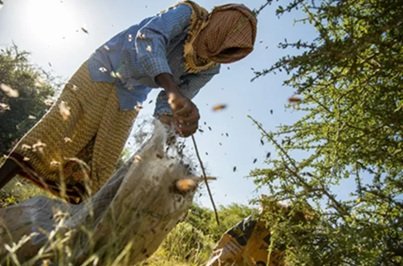By Abdirahman Yusuf Abdi
Bees are among the most vital and irreplaceable species on the planet. Being a natural pollinator, they have a key function in ecosystem health and global food production. More than 75% of flowering plants on Earth and over one-third of all agricultural production depend on pollination, most of which is done by bees. This silent labor sustains forests, fosters diversity, and energizes plant reproduction that feeds wildlife and people. Without bees, entire ecosystems would collapse and global food security would be at risk.
Their economic value is immense as apiculture contribute billions of dollars annually to the agricultural industry by improving crop yields. Across the African continent, where farm work comprises a high proportion of the workforce, bees are adding to food production and generating off-farm livelihoods through honey, beeswax, and other hive products. Beekeeping is now a key source of rural livelihood, women’s income, and smallholder farmer income in countries such as Ethiopia, Kenya, Tanzania, and Uganda. With deforestation, climate change, and the use of chemicals threatening biodiversity, apiculture is an inexpensive, sustainable means of making a living.
Somalia, like other African nations, is beginning to consider the untapped potential of bees. In its arid and semi-arid regions—like Puntland, Somaliland and the riverine south—beekeeping is beginning to appear to be a reasonable means of making a living. Honey is a nutritious food and a traditional medicine, and domestic demand is growing.
One of the major challenges is that there is limited public awareness. There is limited knowledge among most Somali communities, particularly rural communities, of the environmental and economic importance of bees. Bees are not necessarily associated with honey only, as compared to their role as a pollinator and producer of foods. Limited education, poor literacy rates, and the absence of environmental extension or media coverage drive this ignorance. Folkloric explanations sometimes associate bee swarms with danger rather than potential.
Islam also places deep value on bees. The Qur’an honors bees in Surat An-Nahl (The Bee), revealing their purpose and the healing power of their work:

This verse highlights not only the divine inspiration given to bees but also their ability to produce honey that serves as healing for humankind. Islam urges believers to reflect on such signs and act as caretakers of creation (khalīfah). Therefore, protecting bees is not only an ecological and economic necessity—it is a spiritual duty.
In this light, bees must be seen as more than insects—they are the lifeblood of ecosystems, guardians of food security, and a sacred trust for humanity. Preserving them ensures the survival of nature, the dignity of livelihoods, and the fulfillment of our divine responsibility on Earth.
Importance of Bees: Ecology, Biodiversity, Economy, Health
1. Bees as Pollinators in Ecosystems
Bees are nature’s most efficient and widespread pollinators, responsible for fertilizing more than three-quarters of the world’s flowering plant species. This process of pollination enables the production of seeds and fruits, which are vital for plant reproduction and the food supply of countless other organisms. Through their natural behavior of foraging for nectar and pollen, bees inadvertently transfer pollen grains between flowers, triggering fertilization and enabling new plant life. This seemingly simple activity is, in fact, the foundation of terrestrial ecosystems and global food systems.
In agricultural landscapes, pollination by bees is directly linked to the productivity and quality of numerous crops. Fruits, vegetables, nuts, and oilseeds such as melons, pumpkins, sunflowers, and sesame depend heavily on bee pollination for yield formation. In regions like Somalia, where subsistence farming is a major livelihood activity, bees play a silent yet crucial role in supporting household nutrition and income generation. Without bees, many food crops would fail to reach full production potential, threatening food security in already vulnerable communities.
Pollination is also essential in the reproduction of wild plant species, many of which serve as forage for livestock or raw materials for medicine, firewood, and construction. The acacia species in Somalia’s drylands—such as Acacia tortilis (Qudhac) and Acacia seyal (Galool)—rely in part on insect pollinators, especially native bees, to sustain their growth. These trees are not only critical for grazing but also for controlling desertification and sustaining microclimates in arid regions. A reduction in pollinator activity may therefore accelerate land degradation and ecological imbalance.
The decline of bees, caused by habitat loss, pesticides, climate change, and disease, directly undermines the stability of these interconnected systems. As bee populations dwindle, the quality and quantity of both wild and cultivated crops decrease, reducing the availability of seeds, fruits, and plant matter across trophic levels. In turn, this threatens herbivores, predators, and humans alike. Ensuring the survival of bees is thus a foundational component of environmental stewardship and agricultural resilience, particularly in fragile ecosystems like those of the Horn of Africa.
Read more: Endangered and Ignored: The Bee Crisis Taking Root in Somalia’s Drylands
Abdirahman Yusuf Abdi
Email: cycsoome@gmail.com


Leave a Reply